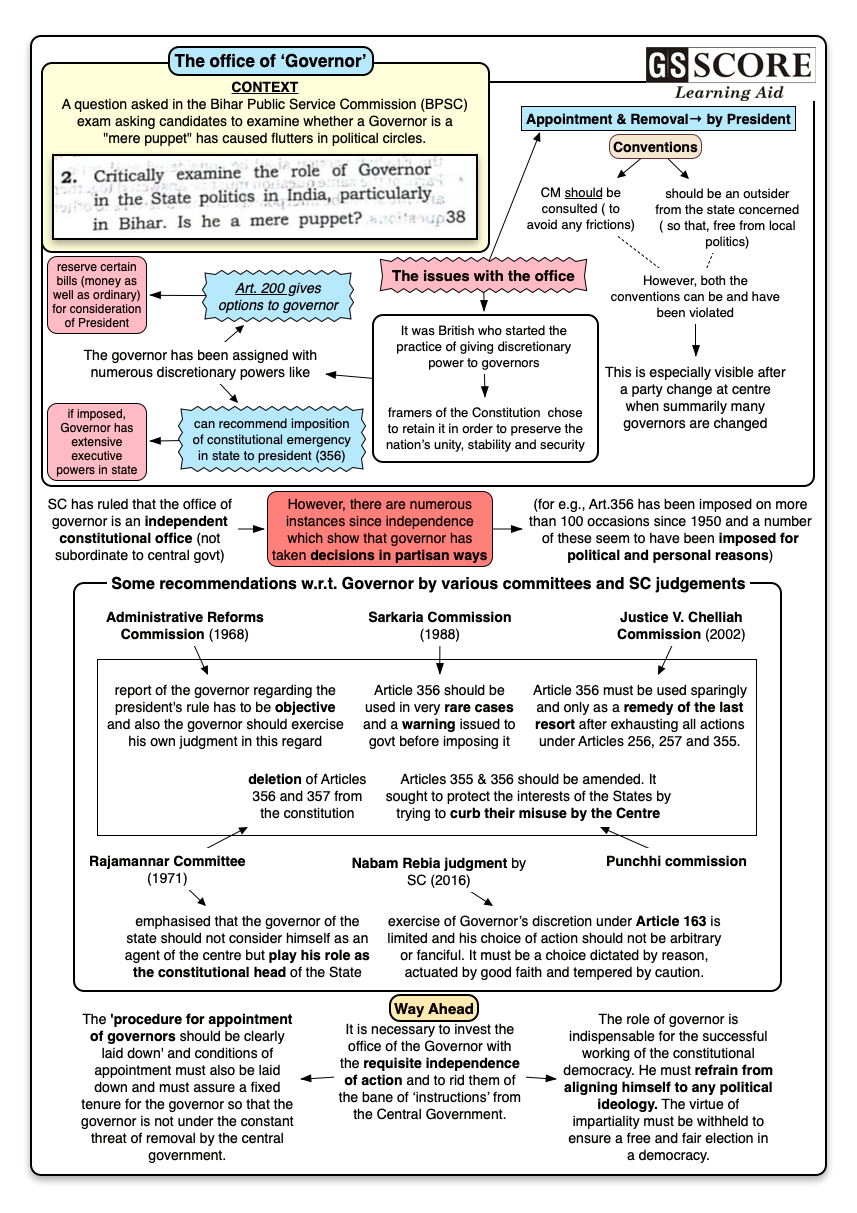Governor
- A question asked in the Bihar Public Service Commission (BPSC) exams asking candidates to examine whether a Governor is a "mere puppet" has caused flutters in political circles.
- "Critically examine the role of Governor in the State politics in India, particularly in Bihar. Is he a mere puppet?" the question asked in the General Knowledge Paper II examination of BPSC Mains read.
Issue
Context:
- A question asked in the Bihar Public Service Commission (BPSC) exams asking candidates to examine whether a Governor is a "mere puppet" has caused flutters in political circles.
- "Critically examine the role of Governor in the State politics in India, particularly in Bihar. Is he a mere puppet?" the question asked in the General Knowledge Paper II examination of BPSC Mains read.
Background
- It was the British who gave special powers to British Governors in order to allow representative government in India and by this they could take important decisions in their discretion.
- After the elections of 1937, Congress won in 7 provinces and demanded the non-interference of British Governors in the functioning of its Ministries and would refrain from exercising “discretion and special powers”.
- But the framers of the Constitution of independent India chose to retain it in order to preserve the nation’s unity, stability and security.
Analysis
Analysis
- From a long time, the office of the Governor has been at the centre of controversies for several reasons, the most important one being the range of discretionary powers that the holder of the office enjoys.
- Discretionary powers of the Governor means the powers which s/he exercises as per one’s own individual judgement or without the aid and advice of the Council of Ministers. The Governor has to perform the duties as head of the state and as an agent of the central government and to use this discretionary power, within the peculiar context of our quasi-federal Constitution.
- The flaw lies not with the identity of the individual who occupies the post, but in the design of our Constitution itself.
Constitutional discretion
The Constitution makes it clear that if any question arises whether a matter falls within the governor’s discretion or not, the decision of the governor is final and the validity of anything done by him cannot be called in question on the ground that he ought or ought not to have acted in his discretion.
- Determining the amount payable by the Government of Assam, Meghalaya, Tripura and Mizoram to an autonomous Tribal District Council as royalty accruing from licenses for mineral exploration
According to the Sixth Schedule, if any dispute arises as to the share of such royalties to be made over to a district council, it shall be referred to the governor for determination and the amount determined by the governor in his discretion shall be deemed to be the amount payable to the district council and the decision of the governor shall be final.
- Seeking information from the chief minister with regard to the administrative and legislative matters of the state
Many governors have been criticised for expanding their discretionary powers suo motu. Tamil Nadu (TN) governor Banwarilal Purohit has been criticised for running a parallel administration of universities within TN and appointing vice-chancellors without consulting the state government. He was already under fire for conducting “review meetings” of government schemes.
- While exercising his functions as the administrator of an adjoining union territory (in case of additional charge)
The Supreme Court’s intervention in the constitutional status of the Lieutenant Governor (L.G.) of Delhi following his tussle with the Delhi government has once again exposed the fissures in the federal structure of the country.
The five-judge bench of the Supreme Court in its judgment in Government of Delhi vs Union of India stated that the elected representative was the real executive and that the L.G. must act as per the “aid and advice” of the elected government except in matters of land, police and public order.
- Reservation of a bill for the consideration of the President
Situations are mentioned in Article 200, when Governor will reserve the bill, yet he can use, discretion regarding this matter.
- Recommendation for the imposition of the President’s Rule in the state
The Governors Committee (1971) laid down the responsibility on the governor to see that the administration of the State does not breakdown due to political instability and he must send a regular report about the political situation of the State.
In such circumstances, if the Governor reports to the President a breakdown of the constitutional machinery in the State, it is clearly in accordance with his discretionary power. However, as we can see above, such powers have led to conflicts from time to time.
Apart from above discretionary powers, there are also situational discretionary powers which add to the menance.
Situational discretion
These are hidden discretion derived from the exigencies of a prevailing political situation:
- Appointment of chief minister when no party has a clear-cut majority in the state legislative assembly or when the chief minister in office dies suddenly and there is no obvious successor
In such cases, governor can favour one political party over others and may even elect a chief minister even with fewer supporters and ask him to prove majority in a specified time. This may even lead to horse trading and defections like it happened in Karnataka recently.
- Dismissal of the council of ministers when it cannot prove the confidence of the state legislative assembly -
When the ministry losses support of the house, the governor will dismiss the ministry. But he cannot dismiss it until it losses majority support.
- Dissolution of the state legislative assembly if the council of ministers has lost its majority
The Governor summons prorogues and dissolves the Legislative Assembly, according to article 174. When the ministry loses the majority and if the Governor is satisfied, s/he may dissolve the House.
Governor may or may not be advised by the ministry to dissolve the Assembly. In this case also, the Governor is fully entitled to act according to his discretion, in the interest of the state concerned thereby leading to conflicts.
To avoid such conflicts, there have been several recommendations by committees and judgements by various courts.
Recommendations of SC Judgements and Committees
- Governor is neither a decorative emblem nor a glorified cipher. His powers are limited, but he has an important constitutional role to play in the governance of the state and in strengthening federalism.
- Now, there is a pressing need to reassess Centre-state relations in general and the functions of the governor in specific. Many committees focused on Articles 356 and 357 like:
- Deletion of articles: The Rajamannar Committee (1971) recommended the deletion of Articles 356 and 357 from the constitution of India and also emphasised that the governor of the state should not consider himself as an agent of the centre but play his role as the constitutional head of the State.
- Rare use of articles: The Sarkaria Commission (1988) recommended that Article 356 should be used in very rare cases when it becomes unavoidable to restore the breakdown of constitutional machinery in the State.
- The commission recommended that before taking action under Article 356, a warning should be issued to the state government that it is not functioning according to the constitution.
- Last way to articles: Justice V. Chelliah Commission (2002) recommended that Article 356 must be used sparingly and only as a remedy of the last resort after exhausting all actions under Articles 256, 257 and 355.
- Amendment in the articles: The Punchhi commission recommended that Articles 355 & 356 be amended. It sought to protect the interests of the States by trying to curb their misuse by the Centre.
- Supreme Court gave many judgements regarding the discretionary powers of Governors like the Nabam Rebia judgment (2016) which emphasized that the exercise of Governor’s discretion Article 163 is limited and his choice of action should not be arbitrary or fanciful. It must be a choice dictated by reason, actuated by good faith and tempered by caution.
- Judgement on the President's Rule: The Administrative Reforms Commission (1968) recommended that the report of the governor regarding the president's rule has to be objective and also the governor should exercise his own judgment in this regard.
Concerns due to abuse of power by Governor
- The union government is able to control the affairs of the states with the Governor who is appointed by them and reports directly to the President.
- Abusing the discretionary powers while selecting the parties to form government will break the democratic set up as government is formed by parties who did not have majority support of people.
- Either way, to stay true to the spirit of the Constitution, the Governor should desist from conferring discretionary powers to his office where there are none.
- The people will lose faith in the office of Governor who in most cases acts like an agent of the union government and not as an independent office.
Way Forward
- It is equally important that the governor must act judiciously, impartially and efficiently while exercising his discretion and personal judgment for the smooth functioning of a democratic government.
- An agreed 'Code of Conduct' should be approved by the state governments to lay down certain 'norms and principles' which should guide the exercise of the governor's 'discretion' and his powers which he is entitled to use and exercise on his personal judgment.
- The 'procedure for appointment of governors should be clearly laid down' and conditions of appointment must also be laid down and must assure a fixed tenure for the governor so that the governor is not under the constant threat of removal by the central government.
- It is necessary to invest the office of the Governor with the requisite independence of action and to rid them of the bane of ‘instructions’ from the Central Government.
- The role of governor is indispensable for the successful working of the constitutional democracy. He must refrain from aligning himself to any political ideology. The virtue of impartiality must be withheld to ensure a free and fair election in a democracy.
Learning Aid






